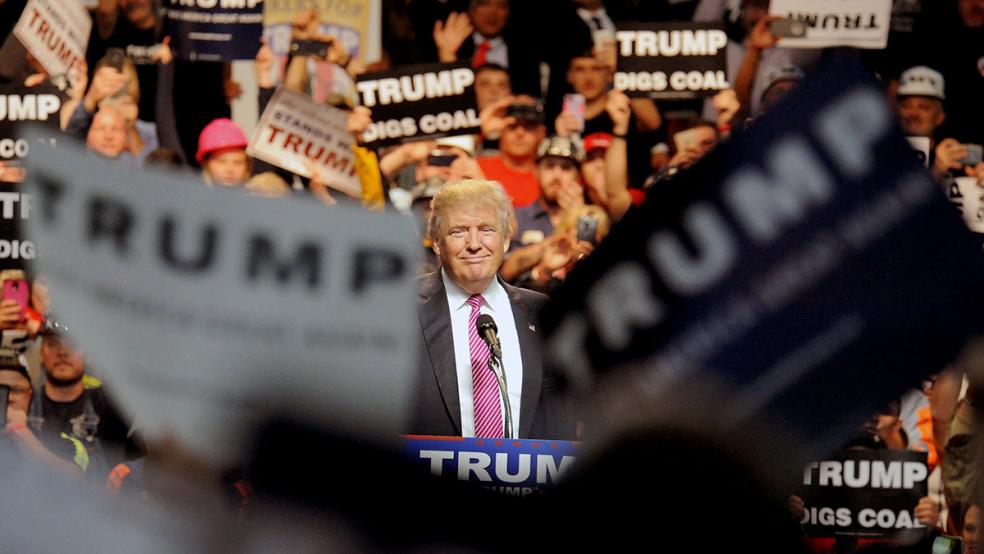As they continue to size up billionaire Donald Trump and former secretary of state Hillary Clinton, American voters appear highly conflicted on questions of national defense and foreign policy.
A new study by the Pew Research Center released Thursday highlighted “deep partisan and ideological divisions” about U.S. foreign policy and defense – including differences over the extent of U.S. involvement overseas, both militarily and economically; the size of the defense budget; the management of the war against ISIS and views on the Israeli-Palestinian conflict.
The conflict makes odd political alliances
Related: Trump Wants to Add to the War on Terror’s $4 Trillion Price Tag
While many believe that Trump will be weakest in debating Clinton on foreign policy matters this fall, there appears to be substantial public agreement for Trump’s “America First.” The idea of putting U.S. interests above all others and for using renewed military prowess and tough bargaining tactics with allies to restore U.S. prestige around the globe sits well with many Americans.
“Our foreign policy is a complete and total disaster,” Trump said during his first foreign policy address in Washington late last month. “No vision. No purpose. No direction.”
Nearly half of all Americans, Democrats and Republicans alike, told Pew that the U.S. is less powerful and important today than it was 10 years ago. Only 21 percent say the country has grown more powerful during the nearly eight years of President Obama’s rule.
While there remains a smattering of sympathy for global engagement, 57 percent of Americans “want the U.S. to deal with its own problems, while letting other countries get along as best they can,” according to the Pew survey’s findings.
Related: Transcript of Donald Trump’s Foreign Policy Speech, April 27, 2016
In terms of trying to solve the world’s problems, Americans believe (41 percent to 27 percent) that the U.S. already does too much. By a 49 percent to 44 percent margin, Americans also believe that it’s “a bad thing” for the U.S. to get involved in international trade deals, which they believe often times lower wages at home and cost American jobs.
Trump has made trade a centerpiece of his appeal to white, working class voters – especially in rust belt states like Ohio, Michigan and Pennsylvania -- who believe they were shafted by misguided trade agreement. And Trump has vowed to tear up NAFTA, the Trans-Pacific Strategic Economic Partnership Agreement and other pacts and start over.
Yet large numbers of Americans disagree strongly with Trump on other key issues. While support has risen substantially for more defense spending in recent years, only 35 percent of those surveyed say the Pentagon’s budget should be increased. Twenty-four percent believe the defense budget should be cut and the remainder said it should stay the same.
There is also widespread rejection of Trump’s criticism of the North Atlantic Treaty Organization (NATO), the post-World War II alliance of western powers. Trump has dismissed NATO as “obsolete” and overly dependent on U.S. financing. Seventy-seven percent of those surveyed by Pew said that NATO is a good thing to preserve.
Related: The Cost of the War Against ISIS: $7 Billion and Counting
Clinton is a strong advocate of international alliances, and said that turning our back on NATO "would reverse decades of bipartisan of American leadership and send a dangerous signal to friend and foe alike.”
Despite Trump’s criticism of Obama’s handling of the war against ISIS, public support for the president has remained steadfast since 2014 when Obama first announced plans for stepped up allied airstrikes against the terrorists in Iraq and Syria. At present, 62 percent approve of Obama’s handling of the war, while 33 percent disapprove.
The new survey was conducted April 12 to 19 among 2,008 adults
William Galston, a political expert with the Brookings Institution, wrote of the Pew findings yesterday that they revealed “important areas of continuity, some dramatic changes, and deep divisions between and even within the political parties.
For example, Pew found that while there is broad support for the military campaign against ISIS, there are sharp differences over how far the U.S. should go in committing troops and resources to the fight in Iraq and Syria. Democrats fear we’ll go too far while Republicans fear we won’t go far enough.
Related: US Says Momentum Has Shifted in the War Against ISIS
As for defense spending, Republicans support increasing the defense budget more than Democrats. And Republicans are more skeptical of U.S. engagement overseas than Democrats.
More than 60 percent of Republicans say the U.S. should mind its own business and focus mainly on its own problems, while only 47 percent of Democrats feel that way. And 55 percent of GOP respondents view U.S. economic engagement overseas negatively, compared to 44 percent of Democrats who feel that way.
Finally, as has been true for nearly 40 years, Americans are far more sympathetic to Israel than to the Palestinians – 54 percent to 19 percent. However, Republicans are more adamant in their support for Israel than are Democrats. And Democrats – especially those supporting Sen. Bernie Sanders of Vermont for president – are far more likely to express sympathy for the plight of the Palestinians.





